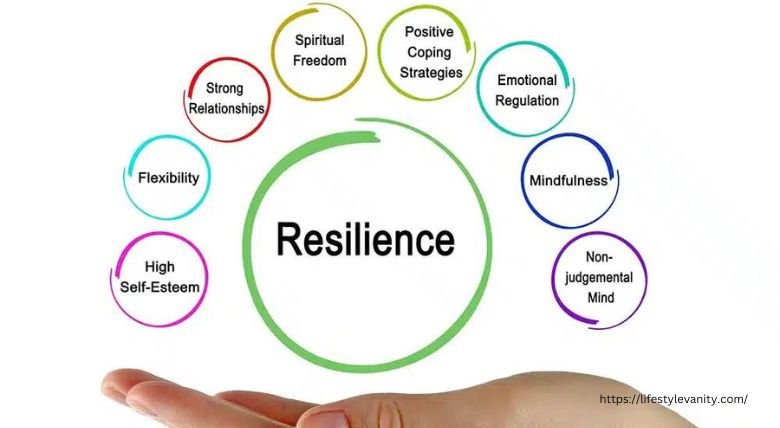What is Resilience?
The uncommon capacity to alter and prosper in confrontations of hardships, deterrents, and mishaps is known as flexibility. Those with inward quality are able to bounce back from attempting times, keep a positive demeanor, and keep going in show disdain toward mishaps. Building strength is basic for one’s enthusiastic and proficient well-being in a world that is continuously changing and full of push and instability. This web journal looks at the thought of flexibility, giving data on its noteworthiness as well as doable strategies to construct versatility.

The Crucial Manual for Bouncing Back from Adversity: Important Ideas
1:Recognize the Adversity
Acknowledge and accept the situation as it is.
Permit yourself to experience and deal with your feelings.
Do not retreat; instead, meet the challenge head-on.
2:Evaluate the circumstances
Step back to assess the circumstances impartially.
Determine the main obstacles and the locations affected.
Assess what you can control and what you cannot.
3:Have an Upbeat Attitude
Pay attention to what you can take away from the hardship.
Continue to be positive and hopeful about the future.
Alter your consideration from negative to great, home appreciation.
4:Make an arrangement of action
Establish feasible targets to offer assistance to overcome hardship.
Divide your targets into more doable, littler steps.
Create an adaptable arrangement that can be balanced to account for advancing conditions.
5:Look for Assistance
Speak with cherished ones, colleagues, and companions for both commonsense and passionate assistance.
Join systems or back bunches that are mindful of your circumstances.
If you require help, do not be anxious to counsel advisors or counselors.
6:Develop Your Resilience
Taking care of yourself will offer assistance if you remain rationally and physically well.
Take part in resilience-enhancing exercises like mindfulness and meditation.
Create adaptive instruments to legitimately control your feelings and stress.
7:Take Absent Information from the Experience
Consider the lessons that difficulty has instructed you.
List the capacities and qualities you picked up from prevailing obstacles.
Apply these realizations to your future planning.
8:Remain Versatile and Flexible
Allow yourself to alter your plans if necessary.
Accept, alter and be arranged to alter to brand-new circumstances.
Develop a demeanor that finds conceivable outcomes in obstacles.
9:Adopt a Steady Approach
Despite moderate advances, never grant up. Keep moving forward.
Prioritize relentless, continuous steps over sudden, expensive ones.
Rejoice in little triumphs to keep your force and inspiration going.
10:Keep a long-term viewer in mind
Recognize that overcoming adversity takes time.
Remember your long term goals and vision.
Stay determined and determined, and rest assured that eventually things will work out.
Overcoming the crisis requires a multi-pronged approach that combines assertiveness, strategy, surface, and flexibility. It is conceivable to overcome obstacles and come out more grounded and more organized to proceed against things in the future by taking a confident approach, asking for help with suggestions when needed, and reliable practice.

The Vital Manual for Building Mental Toughness: Critical Ideas
1:Recognize Mental Hardiness
The capacity to keep up quality, strength, and center in the confrontation of misfortune is known as mental toughness.
It involves remaining idealistic and overcoming deterrents with persistence.
With sophisticated materials and dedication, they can be refurbished and built on for a long time.
2:Set a specific goal
Set challenging but achievable goals for yourself.
Break down difficult goals into smaller achievable ones.
Evaluate and adjust your goals in general to stay on track.
3:Have a happy attitude
Maintain an optimistic state of decision-making skills and focus on what you can control.
Recognize and honor the unusual things in your life to be grateful.
Use positive emphasis to support your determination and confidence.
4:Accept the challenges
Look at obstacles as possibilities for movement and direction.
Often thrust yourself past your consolation zone to create resilience.
Adopt a “can-do” mentality when it comes to fathoming problems.
5:Exercise Self-Control
Create a daily plan that empowers concentration and productivity.
Establish and keep up solid schedules, such as visit work out and an adjusted diet.
Set up the need for your work and remain given to keep up a vital separation from putting things off.
6:Effectively Handle Stress
Acquire and utilize stress-reduction procedures such as yoga, reflection, and significant breathing.
Keep up the keys, remove yourself from burnout, and keep a sound work-life adjustment.
Take stops and grant yourself time to loosen up and revitalize.
7:Improve Your Capacity to Control Emotions
Become cognizant of your sentiments and procure great adapting mechanisms.
Remain on display and less responsive to feelings by locking in mindfulness practices.
To handle your estimations, endeavor journaling or talking to a tried and true friend.
8:Create a Organize of Support
Be in the company of cheery, engaging people who develop your development.
Seek headings and mentoring from people who have illustrated to be normally extreme.
Take part in social exercises that advance camaraderie and solidarity.
9:Learn from Botches and Obstacles
Consider misfortunes as beneficial instructive opportunities.
Examine disappointments in deciding what went off-base and how to settle it.
Make use of mishaps as motivation to keep going.
10:Stay diligent and persistent
Recognize that making mental strength takes time.
Adhere to your goals in the appearance of hate toward deterrents and disappointments.
Recognize that advancement takes time and sharpens self-patience.
A mix of goal-setting, hopeful consideration, self-control, and viable thrust organization are imperative to make mental sturdiness. You may move forward with your mental strength and your capacity to stand up to life’s obstacles head-on with self-assurance and tirelessness by enduring challenges, controlling your sentiments, and being tireless.

Pivotal Manual for Strategies for Resilience: Imperative Ideas
1:Recognize Mental Hardiness
The capacity to keep up quality, versatility, and center in the confrontation of misfortune is known as mental toughness.
It involves remaining idealistic and overcoming impediments with persistence.
With sharpness and commitment, it is conceivable to invigorate and create it over time.
2:Establish Specific Objectives
Set challenging but achievable targets for yourself.
Segment more complex objectives into more doable humbler ones.
Continue to course, assess and alter your goals on a standard basis.
3:Have a happy attitude
Develop specific habits and focus on what you can control.
Recognize and honor the wonderful things in your life to be thankful for.
Use positive affirmations to build your confidence and trust.
4:Accept the challenges
See obstacles as opportunities for growth and education.
Often thrust yourself past your consolation zone to create <em>resilience.
Adopt a “can-do” mentality when it comes to tackling problems.
5:Exercise Self-Control
Create a daily plan that empowers concentration and productivity.
Establish and keep up solid schedules, such as visit work out and an adjusted diet.
Set needs for your work and remain committed to keeping up a key remove from putting things off.
6:Effectively Handle Stress
Acquire and utilize stress-reduction techniques such as yoga, reflection, and significant breathing.
Keep up the key: Remove from burnout and keep a strong work-life adjustment.
Take the delays and deliver yourself time to loosen up and revitalize.
7:Improve Your Capacity to Direct Emotions
Become cognizant of your sentiments and secure great adapting mechanisms.
Remain show and less responsive to feelings by locking in mindfulness practices.
To prepare your sentiments, attempt journaling or talking to a dependable friend.
8. Create a Support Organize
Be in the company of playful, empowering individuals who cultivate your development.
Seek direction and mentoring from individuals who have demonstrated to be rationally tough.
Take part in social exercises that advance camaraderie and solidarity.
9. Learn from Botches and Obstacles
Consider mishaps as beneficial instructive opportunities.
Examine disappointments in deciding what went off-base and how to settle it.
Make use of mishaps as motivation to keep going.
10. Stay tireless and persistent
Recognize that making mental solidness takes time.
Adhere to your targets in appearance and abhor toward impediments and disappointments.
Recognize that improvement takes time and sharpens self-patience.
A mix of goal-setting, cheerful consideration, self-control, and capable thrust organization are imperative to make mental strength. You may advance your mental solidness and your capacity to stand up to life’s hindrances head-on with self-assurance and persistence by enduring challenges, controlling your sentiments, and being steady.

Crucial Elements of the Power of Inspirational Stories
1: Why Motivational Narratives Are Important
Provide inspiration and optimism when things are bad.
Showcase the strength of tenacity and fortitude.
Give realistic instances of people conquering obstacles.
2:Narratives of Individual Success
Honor those who have surmounted major obstacles in their lives.
Tell stories of individuals who, with tirelessness and difficult work, have changed their lives.
Highlight common individuals who are motivated by means of their deeds and mindsets.
3:Instances of Overcoming Physical Difficulties
stories in which competitors with physical impedances accomplish greatness.
Provide declarations from individuals who have recouped from genuine wounds or maladies.
Tell the stories of those who have overcome great physical obstacles to accomplish amazing things.
4:Narratives of Career Achievement
Honor company owners who have created profitable ventures from the ground up.
Tell the encounters of those who overcame misfortune and utilized inventiveness to achieve victory in their careers.
Deliver events for individuals who have utilized incidents as a chance for personal development.
5:Narratives of Social Effectiveness
Highlight those who have had a major profitable effect on their communities.
Tell the stories of those who have begun charitable endeavors or societal change.
Draw consideration to the work of individuals who have made it their life’s work to help others.
6:Illustrations of Imaginative and Creative Achievements
Feature creators, performers, and craftsmen who have surmounted challenges to end up well-known.
Tell stories of creative individuals who have empowered and elevated others by utilizing their gifts.
Tell the stories of those who overcame feedback and dismissal to accomplish success.
7:Narratives of Insightful and Mental Interests
Honor scholastics and analysts who have created ground-breaking findings.
Tell stories of understudies who have surmounted obstruction to succeed academically.
Give events to people who have associated bits of knowledge to handle basic issues.
8:Teachings from Motivational Narratives
Stress the regard of quality and a cheerful outlook.
Emphasize the importance of tirelessness, troublesome work, and commitment.
Demonstrate how getting offered assistance from others may be a key component in overcoming obstacles.
9: How to Find and Spread Motivational Tales
Seek out stories from distributions such as books, recordings, podcasts, and websites.
Tell motivational stories to your cherished ones, companions, and social media followers.
Set up websites and communities given to exchanging and honoring motivational tales.
10:Including Inspiration in Conventional Activities
Utilize motivational stories to drive you toward your objectives.
Consider the morals and lessons that these stories illustrate.
Make an effort to goad others around you with your deeds and attitude.
conclusion
Inspirational stories are powerful updates of the capacity of the human soul to rise over difficulty and accomplish enormity. We can find motivation, pick up smart information, and energize others to take after their objectives and overcome deterrents by examining and considering back on these stories.

